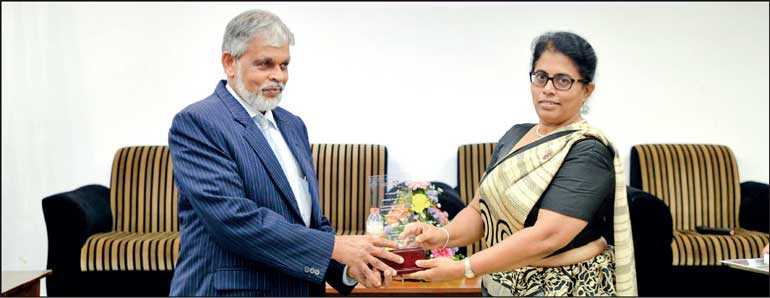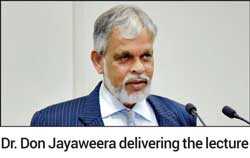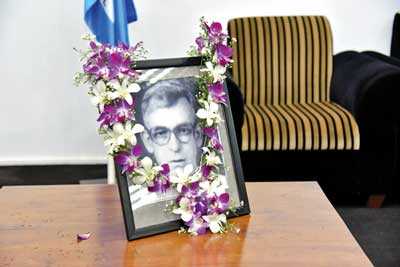Monday Feb 16, 2026
Monday Feb 16, 2026
Monday, 17 December 2018 02:59 - - {{hitsCtrl.values.hits}}

From left: Dr. Lalithasiri Gunaruwan, FCILT, Prof. Amal Kumarage, FCILT Chairman, Namalie Siyambalapitiya, CMILT Secretary/Convener, Capt. Lasitha Cumaratunga, CMILT, Rohaan Abeywickrema, Hon. FCILT

Gayani de Alwis, CMILT handling over the token of appreciation to the speaker

Q&A session in action
The Chartered Institute of Logistics and Transport (CILT), Sri Lanka held its 16th John Diandas Memorial Lecture on 4 October at the Institution of Engineers, Sri Lanka.
John Diandas (Hon. FCIT) known as ‘Mr. Transport’ the world over passed away on 15 July 2002. He was a British citizen born in India in April 1924. He was well known for his extensive knowledge of transport, especially public transport, across the world.
The CILTSL holds three memorial lectures annually in its calendar of events. From its inception the annual John Diandas Memorial Lecture (JDML) was delivered by leading professionals most of who knew John personally. These were always attended by large numbers who are interested about the transport sector.
This year’s lecture was presented by Dr. Don Jayaweera, Transport Economist/Financial Analyst, Project Management Associate International Ltd. who critically evaluated the topic ‘Can we restore the lost market from Bus Passenger Transport System through Bus sector Reforms?’
He outlined the reforms attempts in the bus sector, unresolved supply side issues considered for bus sector reforms and key features of the Sahasara bus passenger reforms project followed by the evaluation of some of the transport development projects and proposals. 
The detailed statistics in the presentation showed background information which consist of the economic data, basic market demand on car ownership and fuel consumption of transport sector. Further Jayaweera emphasised the effect on the traffic, highlighting the fact that “the operated vehicle kilometres has increased, but not the passenger kilometres” during the recent past. He added that the estimated average congestion cost in Colombo Metropolitan Area per day has increased approximately to Rs. 1 billion.
Then he deliberated on bus sector reform strategy for 2018 under conceptual outline of Sahasara which is identified as a cost-free solution for the national transport problem. The basis for Sahasara is that the total daily income of a bus operator should not depend on the number of passengers who board that particular bus. Rather, it should be determined by the total take of all buses plying a route on a given day which should then be fairly distributed among all operators based on the total number of turns each bus plied its route.
The question and answer session of the event was very interesting and interactive with the participation of many stakeholders, which has been moderated by Dr. T. Sivakumar, Senior Lecturer, Department of Transport and Logistics Management, University of Moratuwa. The audience raised many questions on the details of the Sahasara project and made a number of constructive suggestions for consideration in the implementation. Some of the industry leaders such as Prof. Amal Kumarage, FCILT and Dr. Lalithasiri Gunaruwan, FCILT actively participated in this fascinating session. 
CILT is a leading global professional body associated with the logistics and transport industry. Established in UK in 1919 and having received the Royal Charter in 1926, the Institute has an exciting history but is always adapting to stay consistent with current logistics and transport issues. The Institute holds unparalleled international recognition and works towards achieving its objectives of promoting and encouraging the art and science of logistics and transport through its membership and its educational qualifications. With a global
membership of over 34,000 from 35 countries across the globe, CILT provides a professional identity to those in the ever-expanding logistics and transport sector. It is a strong, active and a unified professional association that is able to speak with authority on strategic issues affecting businesses and people in the industry and support their careers.